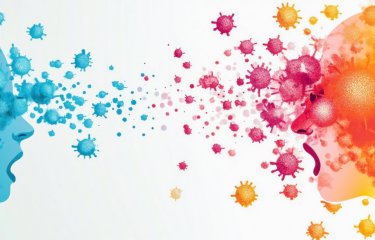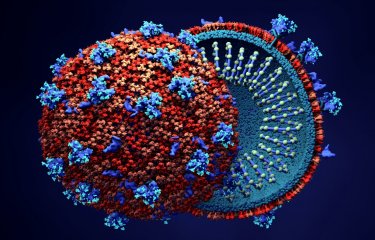Research into epigenetic variation is crucial in understanding how the environment influences human health. Scientists from the Institut Pasteur, the CNRS, Karolinska Institutet (Sweden) and the University of British Columbia (Canada) have shed light on the factors influencing this variability. They particularly focused on the epigenetic effects of age and of a common viral infection (cytomegalovirus). Their study was conducted on a cohort of nearly 1,000 healthy patients.
Epigenetics is the study of molecular mechanisms that modify gene expression without changing DNA sequences. Research on epigenetic variation is therefore critical for human health. One focus of epigenetics is the mechanisms and consequences of DNA methylation. Methylation is the addition of "methyl" chemical groups to the DNA molecule (see "Epigenome" inset below). This reversible process can considerably change the activity of a gene. The term "methylome" is used to refer to all the methylations within a given genome.
DNA methylation is widely studied for its role in cell differentiation. It is also a potential marker of some diseases such as cancer. "Although the effects of aging and smoking on the human methylome are now well known, the epigenetic effects of many other factors, especially related to immunity, have yet to be determined," explains Lluis Quintana-Murci, Head of the Human Evolutionary Genetics Unit at the Institut Pasteur in Paris and a Professor at the Collège de France.
Initial studies on variations in the immune system
The "Milieu Intérieur" project, launched in 2012 (see the press release "The biological basis of good health"), is following a cohort of nearly 1,000 healthy individuals aged 20 to 69 to elucidate the characteristics of a normally functioning immune system. The project is coordinated by the Milieu Intérieur Laboratory of Excellence at the Institut Pasteur, led by Lluis Quintana-Murci and Darragh Duffy (Head of the Translational Immunology Unit).
Based on this cohort, the Laboratory of Excellence has already described large-scale variation in the immune system among the French population. Our age, sex, infection history and genetic makeup can affect our immune system and make us more or less prone to disease.
Two studies, published in December 2017 and February 2018, confirmed in particular that:
- many of the variations in the immune system from one individual to the next are due to differences in age;
- cytomegalovirus infection, which affects 35% of the population, also has a major impact on blood composition.
See The factors that most affect our immune system
But it was not yet clear whether the effects of aging or cytomegalovirus infection on the immune system also have an impact on the methylome. This was the focus of a study published in October 2022 by scientists from the Institut Pasteur, the CNRS, Karolinska Institutet (Sweden) and the University of British Columbia (Canada).
Overestimation of the effects of aging on the methylome
In 2022, again as part of the Milieu Intérieur project, scientists measured the impact of 140 variables related to lifestyle and immunity on the methylome of healthy individuals.
They showed that the effects of aging on the methylome had been overestimated. "We thought that aging directly alters the methylome of all the cells in the body, like an epigenetic clock. We now know that age affects mainly the cellular composition of the blood, which in turn results important changes to the methylome," says Etienne Patin, a CNRS scientist and co-author of this latest study. Moreover, the scientists observed that the epigenetic differences between individuals increased with age, which suggests that the system that maintains DNA methylation levels becomes less reliable as the body ages.
Cytomegalovirus affects the human methylome
As indicated above, we also know that cytomegalovirus infection has an impact on blood composition, which could explain the fact that some people carrying the virus may be more prone to infections.
The study published in 2022 continued the analysis of this highly common, asymptomatic infection. Cytomegalovirus is a virus in the herpes virus family which can remain latent in the body. People who develop symptoms are generally immunocompromised; in other words their immune defenses are weakened.
The latest analyses reveal that cytomegalovirus infection modifies methylation levels in the genome of infected individuals. The virus uses a protein that regulates human DNA (BRD4) to deactivate its own genes and evade immune defenses. This leads to a change in DNA methylation in infected individuals.
Epigenetic variability controlled more by genetics than by the environment
One last finding was revealed following a broader analysis of the different factors affecting the methylome. The scientists' research suggests that much epigenetic variation is controlled by genetics itself. "It appears that genetics has an even greater influence than the environment, which goes against current theories that environmental factors have a strong impact on the human epigenome," summarizes Lluis Quintana-Murci (see "Epigenome" below).
|
A closer look at the epigenome The epigenome refers to all the changes in DNA that modulate gene activity without actually changing the genetic sequence. DNA methylation is one of these changes. A methyl group is a molecule bound to the sequence of a gene. Genes with several methyl groups are under-expressed, whereas genes with virtually no methyl groups are over-expressed. While methylation does not actually change the genetic sequence, it can have a significant impact on gene activity. These epigenetic changes are much more flexible and occur much more quickly than genetic mutations. |
Source:
The immune factors driving DNA methylation variation in human blood, Nature Communications, 06 October 2022
Jacob Bergstedt1,2,3,*, Sadoune Ait Kaci Azzou1, Kristin Tsuo1, Anthony Jaquaniello1, Alejandra Urrutia4, Maxime Rotival1, David T. S. Lin5, Julia L. MacIsaac5, Michael S. Kobor5, Matthew L. Albert4, Darragh Duffy6, Etienne Patin1,#,*, Lluís Quintana-Murci1,7,#,*, Milieu Intérieur Consortium
1Institut Pasteur, Université de Paris, CNRS UMR2000, Human Evolutionary Genetics Unit, Paris, France
2Institute of Environmental Medicine, Karolinska Institutet, Stockholm, Sweden
3Department of Medical Epidemiology and Biostatistics, Karolinska Institutet, Stockholm, Sweden
4HI-Bio, South San Francisco, CA, USA
5Edwin S.H. Leong Healthy Aging Program, Centre for Molecular Medicine and Therapeutics, Department of Medical Genetics, University of British Columbia, Vancouver, Canada
6Institut Pasteur, Université de Paris, Translational Immunology Unit, Institut Pasteur, Paris, France
7Chair of Human Genomics and Evolution, Collège de France, Paris, France
#These authors contributed equally
*Correspondence: jacob.bergstedt@ki.se (J.B.), epatin@pasteur.fr (E.P.), quintana@pasteur.fr (L.Q.-M.)





